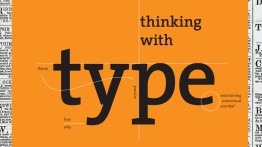COOPERMADE: Thinking with Type

"Thinking with Type is to typography what Stephen Hawking’s A Brief History of Time is to physics." So wrote a reviewer at I Love Typography, a popular typography blog about Ellen Lupton A'85’s 2004 bestseller. Lupton, the Betty Cooke and William O. Steinmetz professor at the Maryland Institute College of Art, has had years of experience teaching young designers, and Thinking with Type reflects both a designer’s accrued knowledge and an educator’s insight into how best to convey principles of good design.
Lupton is renowned as a graphic designer and curator—she is the senior curator of the Cooper Hewitt, Smithsonian Design Museum—and she is also a noted author. Her many books include Herbert Bayer (2020), a biography of the Bauhaus artist focusing on his development as a type designer, Type on Screen (2014), which considers how to adapt type for a digital platform, and Extra Bold: A Feminist, Inclusive, Anti-Racist, Non-Binary Field Guide for Graphic Designers (2021).
Early in her career, Lupton was the first curator at Cooper’s Herb Lubalin Study Center of Design and Typography and today she continues to collaborate with Cooper as a frequent guest and sometime speaker at Typographics, the school’s annual conference for typographers and type designers.





